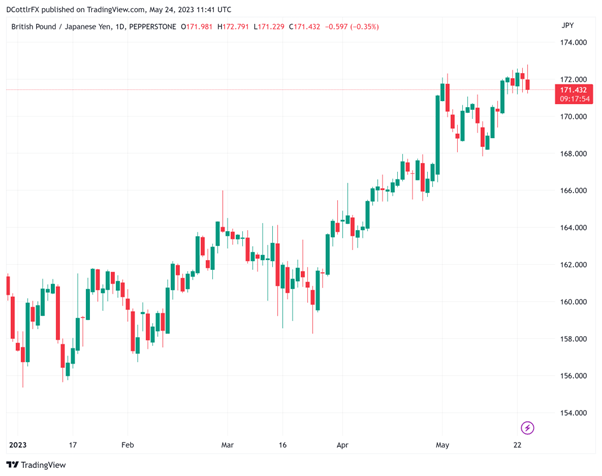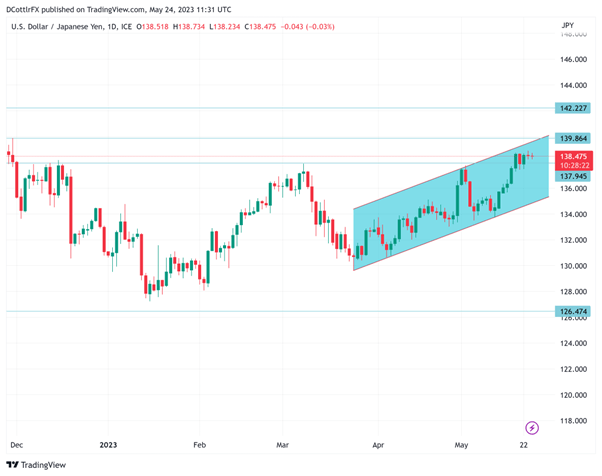- USD/JPY is like all other pairs focused on US debt negotiations
- However, interest rate differentials hugely support the Dollar
- GBP/JPY remains bid as UK inflation numbers strongly suggest rates must rise further
The Japanese Yen remains close to six-month lows against the United States Dollar on Wednesday despite mounting concerns over US debt-ceiling negotiations.
Treasury Secretary Janet Yellen has warned that Washington could run out of cash by June 1 if Congress can’t raise the ceiling. While the overwhelming likelihood must be that a deal will be done in time, this particular act of the long-running Federal debt saga could go down to the wire, jangling global market nerves in the process.
USD/JPY remains largely driven by interest rate differentials, however, with the Japanese central bank alone among major monetary players in pursuing a loose monetary policy despite rampant global inflation. The Bank of Japan has been attempting for decades to stimulate domestic demand and, with the current inflationary wave still judged transitory, it remains on this course.
The US, meanwhile, could yet see further interest rate rises, adding to the US Dollar’s charms against the Japanese unit. The Yen has some charms of its own, however. Data on Tuesday showed that Japan’s manufacturing sector rebounded in May for the first time in seven months, while the service sector experienced a record month of growth. Both sectors seem to be shrugging off their Covid-induced malaise. The Nikkei 225 benchmark stock index is also doing well, attracting foreign investors with the Tokyo Stock Exchange’s push for better corporate governance and, of course, via that weaker Yen which makes Japanese assets a relative bargain for offshore players.
The Japanese Yen’s broad weakness is perhaps best illustrated by its performance against the British Pound. Interest rates are doing the heavy lifting here, too, of course, and with inflation perhaps stickier in the United Kingdom than in any other major economy, the Yen is likely to face further pressure against the British currency.
Headline UK inflation fell in April, albeit by less than economists had expected. At an annualized rate of 8.4%, it came in below the 9% level for the first time in a year. However, that deceleration will offer scant hope to consumers, with food prices still surging. Given this data, it’s all but certain that UK borrowing costs have further to rise, with GBP/JPY pricing that risk accordingly with a rise to seven-year highs this year.
The rest of Wednesday’s session offers little in terms of first-tier economic cues, Markets will get a look at the minutes of the last Federal Open Market Committee meeting but they’re unlikely to wrest focus from the debt ceiling for long.
GBP/JPY Daily Price Chart

USD/JPY Technical Analysis
USD/JPY remains close to the top of the broad daily-chart uptrend channel which has bounded trade since March 24 and which is in any case an extension of the rise up from the lows of January 2022.
Trade has been noticeably more rangebound in the last week or so, with Dollar bulls reluctant to test the channel top which comes in at 139.58 on Wednesday. Still, they have managed to consolidate above the previous significant high, March 7’s intraday peak of 137.94.
Still, bulls look reluctant to probe much higher at present, with further rises likely confined to that channel. Support comes in at 137.62, May 1’s intraday high. The current uptrend looks safe enough unless the channel base at 134.84 is threatened.
Still, IG’s own sentiment indicator suggests that the bulls may be losing heart after a long run higher. Only 31% of respondents declare themselves bullish at current levels.
USD/JPY BULLISH
Data provided by
67% of clients are net short.
| CHANGE IN | LONGS | SHORTS | OI |
| DAILY | -5% | 1% | -1% |
| WEEKLY | -9% | 16% | 7% |
What does it mean for price action?
Get My Guide
USD/JPY Daily Price Chart


